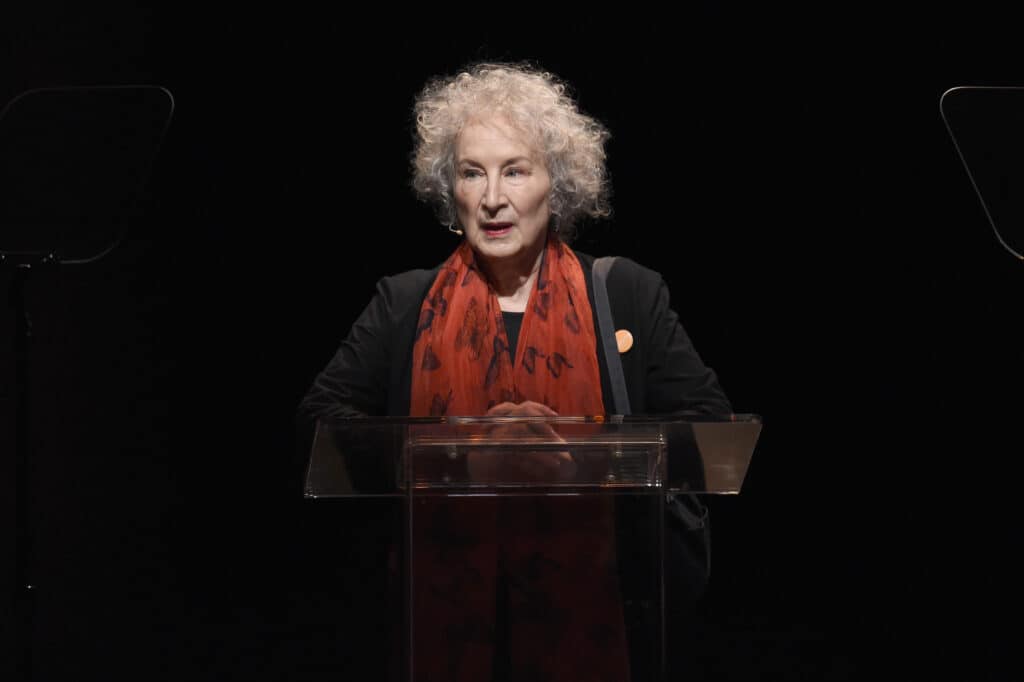‘Gender critical’ journalist tries to grill Margaret Atwood on trans rights. It backfires, badly

Author Margaret Atwood attends the premiere of Hulu’s “The Handmaid’s Tale. (Rich Fury/Getty Images)
Canadian author Margaret Atwood has called out so-called “gender-critical” feminists for being “obsessed” with debating trans people.
Atwood, The Handmaid’s Tale author whose stirring writing has long spooked readers for its almost soothsaying power to predict the future, spoke to British journalist Hadley Freeman for a profile in The Guardian.
The interview, published Saturday (19 February), saw Freeman and Atwood speak over food and drinks at a hotel in Toronto, Canada, ahead of her new collection of essays, Burning Questions.
While discussing the 500-page behemoth, Freeman, who once wrote that she has lost friends over her “gender critical” beliefs, repeatedly pressed Atwood to clarify her at times unclear views on trans rights, even as Atwood expressed her frustration at the “obsessive” questions.
Margaret Atwood, whose fiction has extensively examined genetic engineering, elaborated on her view that sex is not a rigid binary of “sealed either/or compartments” but is a rich, almost kaleidoscopic “flowing bell curve”.
“Respect that!” she urged her two million Twitter followers in 2020. “Rejoice in Nature’s infinite variety!”
“Everything in nature is on a bell curve,” Atwood told The Guardian. “We have this two-box thinking because it’s biblical, so wool over there, linen over there.”
Freeman, she recalled in the article, asked Atwood that if sex is not binary, “How do people how who to make a handmaiden or who is given [female genital mutilation]?”
“OK, let me say this again,” the writer added. “This is going to take a while to settle down, but XY and XX are not the only chromosomal combinations possible. Look it up, OK?
“This has been in flux for a very long time and in the Bible, a male wearing female clothes would be,” she said, making a slicing gesture across her neck. “You want to do that? No.”
And scientists would agree. Researchers have increasingly called on “gender-critical” feminists to “stop using phoney science to justify transphobia“.
Classroom biology of XX and XY chromosomes isn’t quite in step with how scientists see biological sex, they stress, with the system being far more complex in not only earthworms, fungi and the recently discovered dual-gendered stick insect but in humans, too.
Intersex people, for example, are born with a particular set of sex characteristics – such as chromosomes, genitalia, reproductive anatomy and hormones – that don’t fit neatly into typical binary categories of male or female.
As the Intersex Society of North America wrote more than 20 years ago: “Nature doesn’t decide where the category of ‘male’ ends and the category of ‘intersex’ begins, or where the category of ‘intersex’ ends and the category of ‘female’ begins. Humans decide.”
Margaret Atwood: ‘It is not true that there are no trans people’
Freeman stressed that “gender critical” people consider sex differently, defining them as people who see “living creatures are either male or female”. We guess earthworms and people don’t count as living things.
“I’m not going to argue about this,” Margaret Atwood interjects, stressing that she is here to discuss her book.
Freeman, again, brings the conversation back to anti-trans viewpoints, this time about Atwood’s criticisms of JK Rowling’s controversial comments on trans rights.
To Freeman, Atwood is “up there with […] JK Rowling” in terms of her storytelling ability.
Atwood, however, stressed that as much as she is a heralded figure in modern feminism, she simply is not “informed” enough and called out Freeman for seemingly being “obsessed” with this line of questioning.

“Open question,” Margaret Atwood said. “We’re not even sure what anti-trans is and the trans community will take a while to sort this through.
“It is not true that there are no trans people, so then a lot of questions come into that and we’re not going to get into those, although they seem to be your obsession of the day.”
After Freeman – you guessed it – again asked a question about trans rights, this time about Atwood’s use of TERF in reference to a tweet about Rowling’s views. Atwood immediately bristled.
“I think you’re making too much of this!” The Testaments author said.
The poet’s refusal to engage with Freeman’s questions drew praise on Twitter. As one user wrote: “Protect Margaret Atwood at all costs.”
The “debate” over the rights of trans people in Britain has reached levels so “toxic” that, to human rights activists, it will damage society if it goes on any longer.
The Council of Europe, the continent’s leading human rights organisation, recently denounced Britain’s “virulent attacks” against LGBT+ people, placing it in company with Russia and Hungary.
Delegates added that to believe in “gender critical” views is to “deny the existence of LGBTI people [and] dehumanise them”.
Such views are “deeply damaging” and amount to a “direct challenge to democracy” that is stoking the “stagnation and backsliding in progress” when it comes to queer, reproductive and women’s rights.

